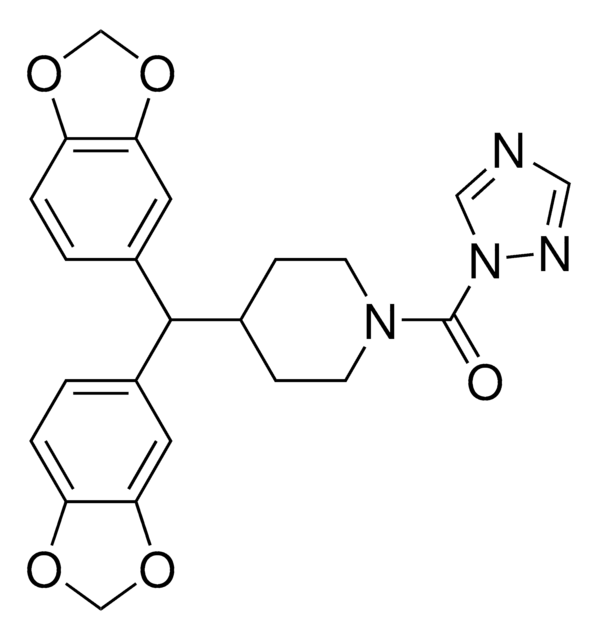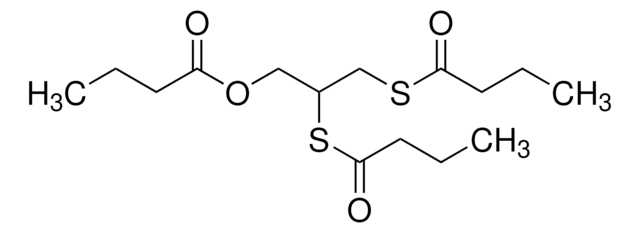O4139
Orlistat
≥98% (HPLC), solid, lipase inhibitor
Synonym(s):
(−)-Tetrahydrolipstatin, N-Formyl-L-leucine (1S)-1-[[(2S,3S)-3-hexyl-4-oxo-2-oxetanyl]methyl]dodecyl ester, Ro-18-0647
About This Item
Recommended Products
product name
Orlistat, ≥98%, solid
biological source
synthetic (organic)
Quality Level
Assay
≥98%
form
solid
color
white
mp
<50 °C
solubility
DMSO: 19 mg/mL
originator
Roche
storage temp.
2-8°C
SMILES string
CCCCCCCCCCC[C@@H](C[C@@H]1OC(=O)[C@H]1CCCCCC)OC(=O)[C@H](CC(C)C)NC=O
InChI
1S/C29H53NO5/c1-5-7-9-11-12-13-14-15-16-18-24(34-29(33)26(30-22-31)20-23(3)4)21-27-25(28(32)35-27)19-17-10-8-6-2/h22-27H,5-21H2,1-4H3,(H,30,31)/t24-,25-,26-,27-/m0/s1
InChI key
AHLBNYSZXLDEJQ-FWEHEUNISA-N
Gene Information
human ... LIPF(8513) , PNLIP(5406)
Looking for similar products? Visit Product Comparison Guide
General description
Application
- of fatty acid synthase in long-term estrogen-deprived (LTED) variant cell lines
- of lipase in screening lipase inhibition by raspberry extract
- in in vitro pancreatic lipase activity assay
Biochem/physiol Actions
Features and Benefits
Other Notes
Storage Class Code
11 - Combustible Solids
WGK
WGK 3
Flash Point(F)
Not applicable
Flash Point(C)
Not applicable
Personal Protective Equipment
Certificates of Analysis (COA)
Search for Certificates of Analysis (COA) by entering the products Lot/Batch Number. Lot and Batch Numbers can be found on a product’s label following the words ‘Lot’ or ‘Batch’.
Already Own This Product?
Find documentation for the products that you have recently purchased in the Document Library.
Customers Also Viewed
Articles
Fatty acid synthesis supports cancer cell proliferation, essential for membrane generation, protein modification, and bioenergetics.
Fatty acid synthesis supports cancer cell proliferation, essential for membrane generation, protein modification, and bioenergetics.
Fatty acid synthesis supports cancer cell proliferation, essential for membrane generation, protein modification, and bioenergetics.
Fatty acid synthesis supports cancer cell proliferation, essential for membrane generation, protein modification, and bioenergetics.
Protocols
Lipoprotein lipase (LPL) hydrolyzes triglycerides associated with VLDL.
Our team of scientists has experience in all areas of research including Life Science, Material Science, Chemical Synthesis, Chromatography, Analytical and many others.
Contact Technical Service











